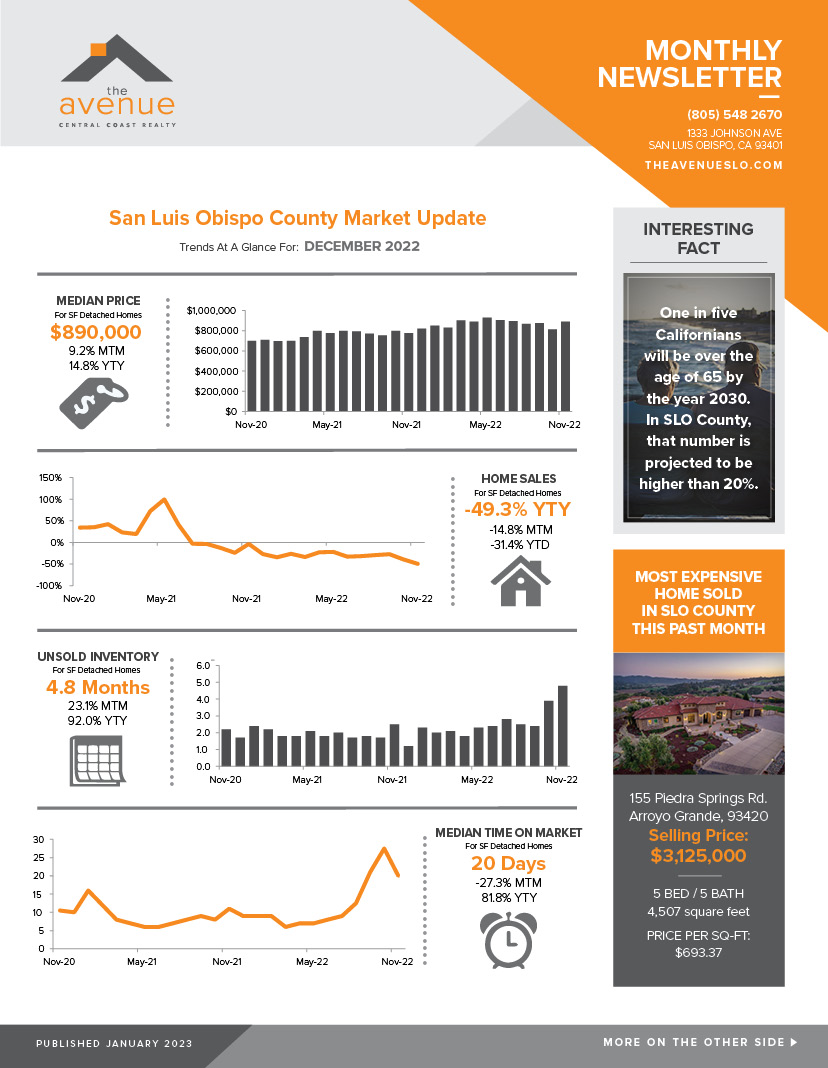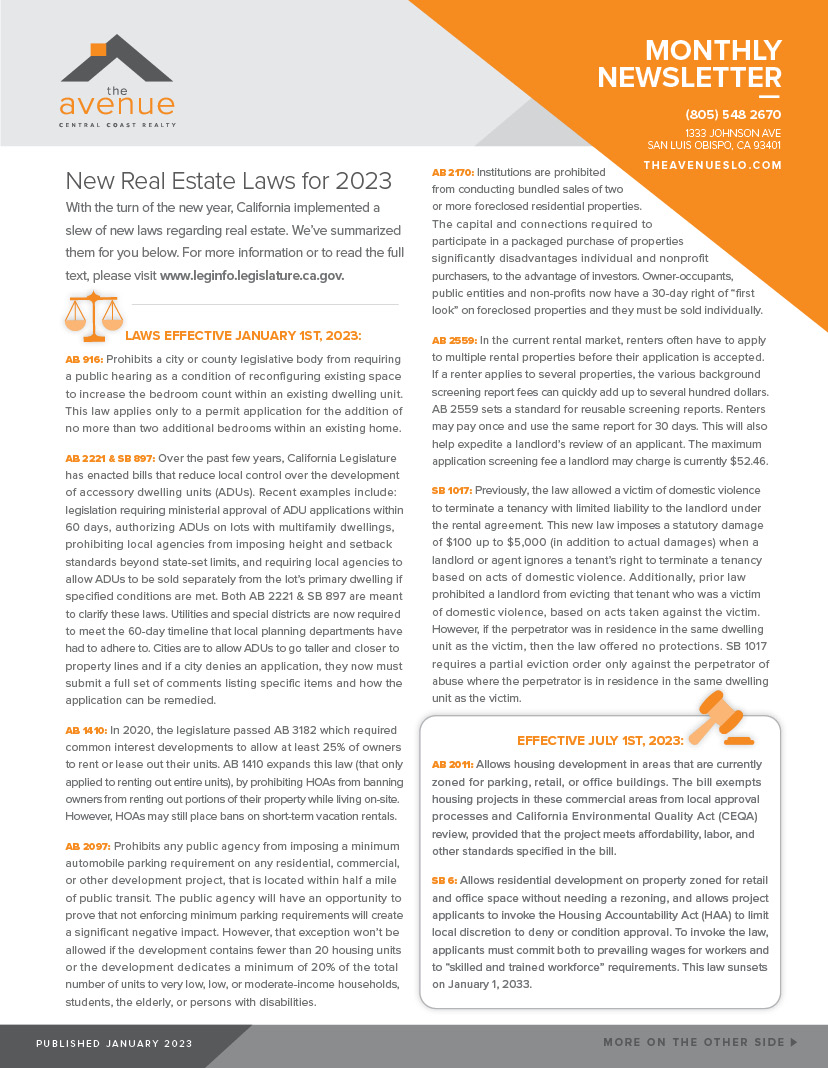SLO County Market Update / New Real Estate Laws for 2023
With the turn of the new year, California implemented a slew of new laws regarding real estate. We’ve summarized them for you below. For more information or to read the full text, please visit www.leginfo.legislature.ca.gov.
LAWS EFFECTIVE JANUARY 1ST, 2023:
AB 916: Prohibits a city or county legislative body from requiring a public hearing as a condition of reconfiguring existing space to increase the bedroom count within an existing dwelling unit. This law applies only to a permit application for the addition of no more than two additional bedrooms within an existing home.
AB 2221 & SB 897: Over the past few years, California Legislature has enacted bills that reduce local control over the development of accessory dwelling units (ADUs). Recent examples include: legislation requiring ministerial approval of ADU applications within 60 days, authorizing ADUs on lots with multifamily dwellings, prohibiting local agencies from imposing height and setback standards beyond state-set limits, and requiring local agencies to allow ADUs to be sold separately from the lot’s primary dwelling if specified conditions are met. Both AB 2221 & SB 897 are meant to clarify these laws. Utilities and special districts are now required to meet the 60-day timeline that local planning departments have had to adhere to. Cities are to allow ADUs to go taller and closer to property lines and if a city denies an application, they now must submit a full set of comments listing specific items and how the application can be remedied.
AB 1410: In 2020, the legislature passed AB 3182 which required common interest developments to allow at least 25% of owners to rent or lease out their units. AB 1410 expands this law (that only applied to renting out entire units), by prohibiting HOAs from banning owners from renting out portions of their property while living on-site. However, HOAs may still place bans on short-term vacation rentals.
AB 2097: Prohibits any public agency from imposing a minimum automobile parking requirement on any residential, commercial, or other development project, that is located within half a mile of public transit. The public agency will have an opportunity to prove that not enforcing minimum parking requirements will create a significant negative impact. However, that exception won’t be allowed if the development contains fewer than 20 housing units or the development dedicates a minimum of 20% of the total number of units to very low, low, or moderate-income households, students, the elderly, or persons with disabilities.
AB 2170: Institutions are prohibited from conducting bundled sales of two or more foreclosed residential properties. The capital and connections required to participate in a packaged purchase of properties significantly disadvantages individual and nonprofit purchasers, to the advantage of investors. Owner-occupants, public entities and non-profits now have a 30-day right of “first look” on foreclosed properties and they must be sold individually.
AB 2559: In the current rental market, renters often have to apply to multiple rental properties before their application is accepted. If a renter applies to several properties, the various background screening report fees can quickly add up to several hundred dollars. AB 2559 sets a standard for reusable screening reports. Renters may pay once and use the same report for 30 days. This will also help expedite a landlord’s review of an applicant. The maximum application screening fee a landlord may charge is currently $52.46.
SB 1017: Previously, the law allowed a victim of domestic violence to terminate a tenancy with limited liability to the landlord under the rental agreement. This new law imposes a statutory damage of $100 up to $5,000 (in addition to actual damages) when a landlord or agent ignores a tenant’s right to terminate a tenancy based on acts of domestic violence. Additionally, prior law prohibited a landlord from evicting that tenant who was a victim of domestic violence, based on acts taken against the victim. However, if the perpetrator was in residence in the same dwelling unit as the victim, then the law offered no protections. SB 1017 requires a partial eviction order only against the perpetrator of abuse where the perpetrator is in residence in the same dwelling unit as the victim.
EFFECTIVE JULY 1ST, 2023:
AB 2011: Allows housing development in areas that are currently zoned for parking, retail, or office buildings. The bill exempts housing projects in these commercial areas from local approval processes and California Environmental Quality Act (CEQA) review, provided that the project meets affordability, labor, and other standards specified in the bill.
SB 6: Allows residential development on property zoned for retail and office space without needing a rezoning, and allows project applicants to invoke the Housing Accountability Act (HAA) to limit local discretion to deny or condition approval. To invoke the law, applicants must commit both to prevailing wages for workers and to “skilled and trained workforce” requirements. This law sunsets on January 1, 2033.
Interesting Fact:
One in five Californians will be over the age of 65 by the year 2030. In SLO County, that number is projected to be higher than 20%.




